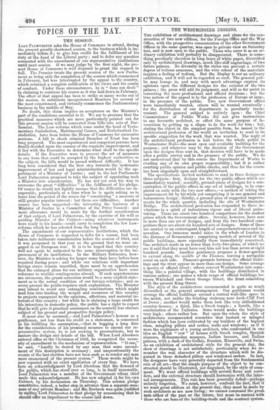TOPICS OF THE DAY.
THE SESSION.
LORD PALI, EILSTON asks the House of Commons to attend, during the present greatly shortened session to the business which is immediately. before it ; to give him credit for the fulfilment of his duty at the head. of the Liberal party ; and to defer any cluestion connected with the amendment of our representative institutions until next session. If we may judge by the first night, the present House of Commons is well disposed to grant the request in full. The Premier treats the present session of the new Parliament as being only the completion of the session which commenced in February, but was interrupted by the appeal to the country, which returned a complete ratification of his views and his course of conduct. Under these circumstances, he is " dans son droit " in claiming to continue his course as it was laid down in February. The effect of that appeal has been to strike so many weeks out of the session, to substitute inexperienced Members for several of the most experienced, and virtually commences the Parliamentary business in the middle of May.
No doubt, this claim implies an acceptance on the Minister's
part of the conditions essential to it. We are to presume that the practical measures which are more particularly pointed out for this present session will be converted from bills into acts of Parliament. The Law-reforms which come under the head of Testamentary Jurisdiction, Matrimonial Causes, and Ecclesiastical Jurisdiction, have been before the House of Commons for successive sessions. A bill to check criminal Breaches of Trust has been long prepared. The most experienced and competent persons have finally decided upon the essence of the requisite improvement, and it lies with the Executive to determine what shall be the specific details. If the Executive were to present the set of measures in any form that could be accepted by the highest authorities on the subject, the bills would be passed without difficulty. It has long been considered that the first step towards the systematic improvement of law and legal administration would be the appointment of a Minister of Justice ; and in the last Parliament Lord Palmerston promised to take the subject of appointing such a Minister into consideration. He has not yet seen his way, to overcome the great " difficulties " in the fulfilment of his pledge. Of course he would not lightly assume that the difficulties are insuperable, particularly at a time when he is again asking us to leave him the period of the recess for "considering" a measure of still greater popular interest: but there are difficulties. Another course has been suggested—the intrusting the business of a Minister of Justice to a Committee of the Privy Council: and more allowance would be made for the further consideration of that subject, if Lord Palmerston, by the exercise of his will as guiding Minister of the Cabinet—using whatever instruments were ready to his hands—could carry to completion the few Lawreforms which he has selected from the long list.
The amendment of our representative institutions, which the House of Commons is requested to defer for a season, had been taken into deliberate consideration before the session of 1854, and it was postponed in that year on the ground that we were engaged in an European war. It is to be hoped that this country will not again be subjected to the same interruption in the improvement of its institutions. In the Military Estimates, however, the Minister is asking for larger sums than have before been required during peace ; and while our relations with important foreign states remain unsettled, there must be an apprehension that the enlarged plans for our military organization have some reference to warlike contingencies abroad. If such apprehensions are erroneous, the grand correction would be a more explicit statement as to the actual condition of our foreign relations ; and on every ground the public requires such explanation. The Minister may intend to avoid any entangling combinations which might lead him into lending the weight and resources of this country to projects repugnant to the opinions, affections, and material interests of this country ; but while he is claiming a large credit for his intentions in domestic policy, the public has a right to expect that he will give it practical assurances on the scarcely less obscure subject of his present and prospective foreign policy. It must also be assumed,—and Lord Palmerston 's honour as a gentleman, not less than his credit as a statesman, is concerned in his fulfilling the assumption,—that in begging a long data for the consideration of his promised measure to amend our representative system, he is not seeking to procrastinate, but to mature the design and details of the bill. When Lord Aberdeen entered office at the Christmas of 1852, he recognized the necessity of amendment in the mechanism of representation. "It can," he said, "hardly be denied by any man that some amend
ment of this description is necessary ; and unquestionably the events of the last election have not been such as to render any man more enamoured of the present system." These words might be now repeated with an exact application of every line. We have here an acknowledgment by Lord Aberdeen that the demand of the public, which has stood over so long, is in itself reasonable. Lord Palmerston was a member of the Government whose chief made this acknowledgment. He has now adopted it for his own Cabinet, by his declaration on Thursday. This solemn pledge constitutes, indeed, a better step in advance than a separate measure of any private Member ; and Mr. Roebuck was quite justified in nailing Lord Palmerston to that pledge bv announcing that he should oiler no impediment to the course laia down.


























 Previous page
Previous page